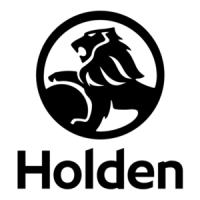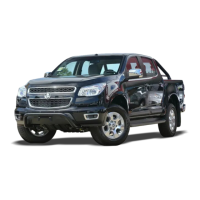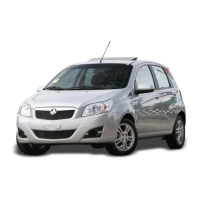
Do you have a question about the HOLDEN Trailblazer RG MY18 and is the answer not in the manual?
| Brand | HOLDEN |
|---|---|
| Model | Trailblazer RG MY18 |
| Category | Automobile |
| Language | English |
Explains safety alert symbols and their meanings for vehicle operation.
Overview of the instrument panel and its components.
Covers essential information for the first drive, including keyless entry and starting procedures.
Details about vehicle keys, remote controls, and manual door lock operation.
Information on operating and securing vehicle doors, including the tailgate.
Instructions for adjusting front and rear seat head restraints for safety.
Guidance on adjusting front seat position, backrest, and height for optimal comfort and safety.
Explains how belt force limiters reduce stress on the body during a collision.
Details on how seat belts tighten during a collision for occupant safety.
General information and warnings regarding the use of child restraint systems.
Instructions for installing child restraints using the ISOFIX system.
Overview of various storage locations within the vehicle.
Details on the upper storage compartment in the instrument panel.
A comprehensive guide to the vehicle's instrument panel indicators and displays.
Explains various controls for steering wheel adjustment, lights, wipers, and power outlets.
Information on the vehicle speed display in kilometers per hour (km/h).
Explains the system that reminds passengers to fasten their seat belts.
Details on the system that indicates rear passenger seat belt status.
Explains the indicator for detecting vehicles ahead and proximity warnings.
Information on the indicator light for the Electronic Stability Control system.
Explains the various warning chimes that may sound in the vehicle.
Information on messages related to battery voltage and charging status.
Message indicating the status of the parking brake.
Notification that the Hill Start Assist system is active.
Alerts related to reduced engine power and potential causes.
Messages concerning fuel level and potential water in the fuel system.
Messages related to the vehicle's key and lock system.
Alerts indicating issues with vehicle lamps, such as a burnt bulb.
Information on messages related to the electric power steering system.
Alerts and information regarding the Tire Pressure Monitor System (TPMS).
Indicates when a gear shift is denied due to unsuitable vehicle speed.
Notification that the grade braking feature has been activated.
Warning about potential icy conditions and advice to drive with care.
Notification that the Parking Assist system has been turned off due to a fault.
Alerts when the vehicle speed exceeds the adjusted set speed.
Information on the trip computer and its various displays.
How to adjust vehicle settings via the Driver Information Centre.
Procedure for setting a speed warning signal.
Guide to operating the exterior lights, including automatic light control.
Explanation of the automatic light system operation.
Information on Daytime Running Lamps for increased visibility.
Operation of hazard warning flashers and their automatic activation.
Instructions for operating the front fog lamps for improved visibility.
Information on reverse lamps illuminating when reverse gear is engaged.
How to adjust the brightness of the instrument panel lighting.
Information on illumination in the load compartment.
Location and operation of the reading lamps.
Illumination provided by the vanity mirror cover on the sun visor.
How entry lighting provides security when returning to the vehicle at night.
Explanation of interior lamps illuminating after key removal from ignition.
Overview of the infotainment system and its available configurations.
Detailed guide to AM-FM radio operation, station selection, and favorites.
Instructions for using the USB port to play music or movies.
How to access and scroll through content from indexed media sources.
How to adjust audio volume using steering wheel controls.
Controls for seeking radio stations or changing audio tracks.
Managing applications within the tray on the infotainment screen.
Detailed guide to playing the radio, selecting bands, and tuning stations.
Instructions for seeking and directly tuning radio stations.
Steps to listen to DAB radio and select stations.
How to automatically search for available radio stations.
Function to switch between same service on another DAB ensemble.
Function to switch to a corresponding FM station when DAB signal is weak.
Instructions for removing and installing the roof antenna.
Details supported file extensions and limitations for picture viewing.
How to connect a USB device and view picture files.
Information on playable movie file formats, codecs, and bitrates.
Steps to connect a USB device and play movie files.
How to connect external audio devices via the auxiliary input jack.
Instructions for playing music from a connected auxiliary device.
Options for adjusting tone settings and managing Bluetooth devices.
How to add or delete Bluetooth devices from the system.
Guide to accessing and using the navigation application.
Options for displaying map views, including 3D and North Up views.
Different ways to enter a destination, such as address or POI.
Information on alerts for upcoming turns and maneuvers.
How to initiate a search for destination details.
How to display and select from a list of matches.
How to select and save destinations from contacts or recent entries.
Accessing and managing the vehicle's contact list.
How to save locations as Favorites directly from the map view.
Steps to start route guidance and manage active routes.
How to modify the order or remove waypoints from a route.
Adjusting voice recognition settings like confidence threshold and prompt length.
How to adjust the system's response sensitivity for voice commands.
Adjusting the speed of audio feedback for voice commands.
Option to turn display tips for voice commands on or off.
Controls map colors by adjusting screen background based on lighting conditions.
Procedure for calibrating the touchscreen for accurate input.
System alert for low fuel conditions, with options to view nearby gas stations.
Explanation of how the vehicle's position is determined and factors affecting accuracy.
Common issues and conditions that can lead to inappropriate route guidance.
Guidelines for using Holden genuine parts and accessories.
Procedures for storing the vehicle for extended periods.
Guidance on performing basic service tasks yourself.
Instructions on how to open and close the vehicle's bonnet.
Instructions for checking and adding engine oil.
Step-by-step guide to checking the engine oil level.
Information on the system that indicates when to change engine oil and filter.
Explanation that checking transmission fluid level is typically done by a dealer.
Guidance on checking and adding engine coolant.
Steps to check the coolant level in the reservoir.
Instructions for adding washer fluid and recommended additives.
Warnings and cautions related to brake fluid.
Procedures for topping up brake fluid with the recommended type.
Safety warnings and precautions for working with the vehicle battery.
Procedure for disconnecting the vehicle battery to prevent discharge.
Information on the fuel filter and the 'Water in Fuel' warning message.
Guidance on when and how to replace wiper blades.
Instructions for replacing various vehicle bulbs.
Steps for replacing the high beam headlight bulb.
Warning regarding condensation in exterior lamp lenses.
Recommendation to visit a dealer for headlight aiming due to safety concerns.
Procedure for replacing front turn signal lamp bulbs.
Information on replacing turn signal lights, noting LED versions.
Guidance on replacing tail and brake lights, recommending dealer service for LED versions.
Information on fuse box locations and fuse replacement precautions.
Description of the usage for each mini fuse in the engine compartment fuse block.
Description of the usage for each JCase fuse.
Information on Maxi fuses, including location.
Description of the usage for various relays.
Location and removal instructions for the vehicle jack and tools.
Advice on maintaining tyre and rim condition to prevent damage.
Importance of maintaining correct tyre pressure for safety and performance.
Information about the TPMS, its function, and sensor calibration.
Warning about modifications to the TPMS and proper tire maintenance.
Process for calibrating TPMS sensors after tire changes.
Defining tire pressure settings based on vehicle load and occupancy.
Warning that TPMS is not a substitute for proper tire maintenance.
Explains the TPMS malfunction indicator and associated messages.
Importance of checking tire tread depth at regular intervals.
Factors to consider when purchasing new tires.
Guidelines for using factory-approved wheel covers.
Criticality of using Holden-approved roo/nudge bars for compatibility.
Instructions for reversing the snorkel intake in specific conditions.
Safety warnings for all passengers during jacking and wheel changing.
Detailed steps for safely jacking the vehicle to change a wheel.
Advice on not removing wheel nuts at an early stage.
Critical safety warnings and procedures before attempting to jump start the vehicle.
Step-by-step instructions for jump starting a vehicle with a discharged battery.
Best methods for towing the vehicle to avoid damage, including flat-bed towing.
Guidelines for emergency towing on hard-surfaced roads at low speeds.
Important notes regarding towing, including driver presence and vehicle condition.
Recommendations for maintaining the vehicle's exterior appearance through washing and waxing.
Detailed advice on washing the vehicle to protect paintwork.
Guidelines for waxing the vehicle to maintain paintwork protection.
Care instructions for cleaning windows and replacing wiper blades.
Importance of cleaning the underbody to prevent rust from corrosive materials.
Warnings and recommendations for cleaning interior surfaces safely.
Cleaning recommendations for plastic and rubber parts.
Ensuring floor mats are securely fastened and do not interfere with pedal operation.
Importance of adhering to maintenance schedules for economical and safe operation.
How the system monitors and indicates engine oil change requirements.
Table listing recommended engine oil, coolant, and other fluid specifications.
Information on locating the Vehicle Identification Number (VIN) and Identification Plate.
Details on engine type, number of cylinders, power, torque, and fuel type.
Location of the label containing the vehicle's built date.
Specifications for the 2.8L L4 Turbo Diesel engine.
Table showing carrying capacity for different trims and example loading guides.
Maximum front and rear axle load limits for the vehicle.
Specifies the maximum permissible loads for the front and rear axles.
Table of vehicle dimensions including length, width, height, track, and wheelbase.
Details the engine type, oil capacity, coolant capacity, and fuel tank size.
Information on tyre sizes and recommended inflation pressures.
Table showing recommended tyre pressures for various load conditions.
Lists trademarks and licensing information for vehicle components.
Information on obtaining assistance from Holden Customer Care and Dealerships.
Provides contact details and operating hours for Holden Customer Care.
Information specific to New Zealand customers for assistance and contact details.
Explains the vehicle's data recording systems and privacy policy.











